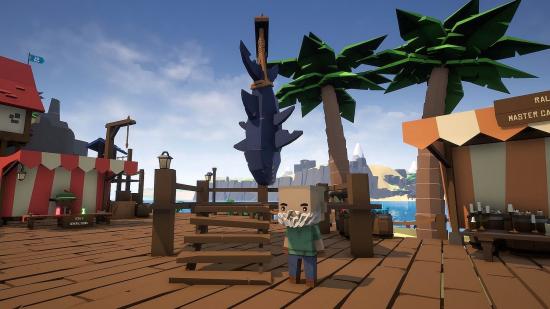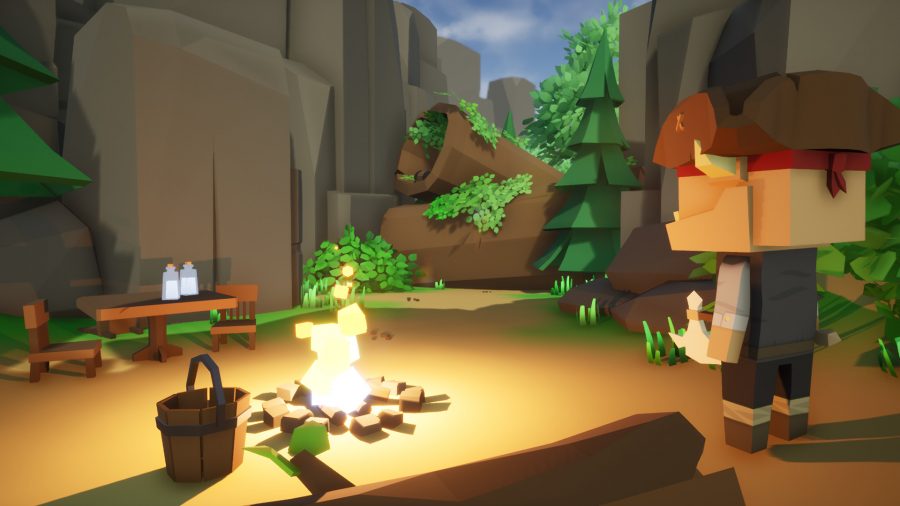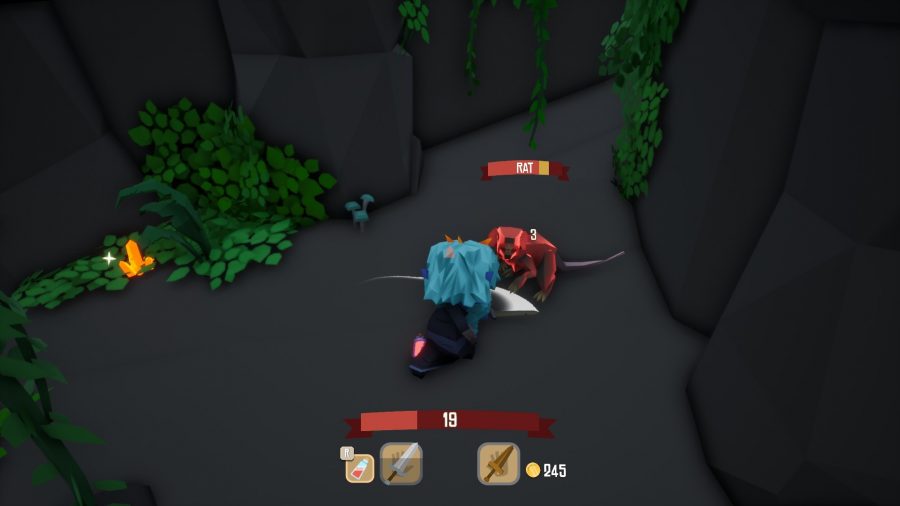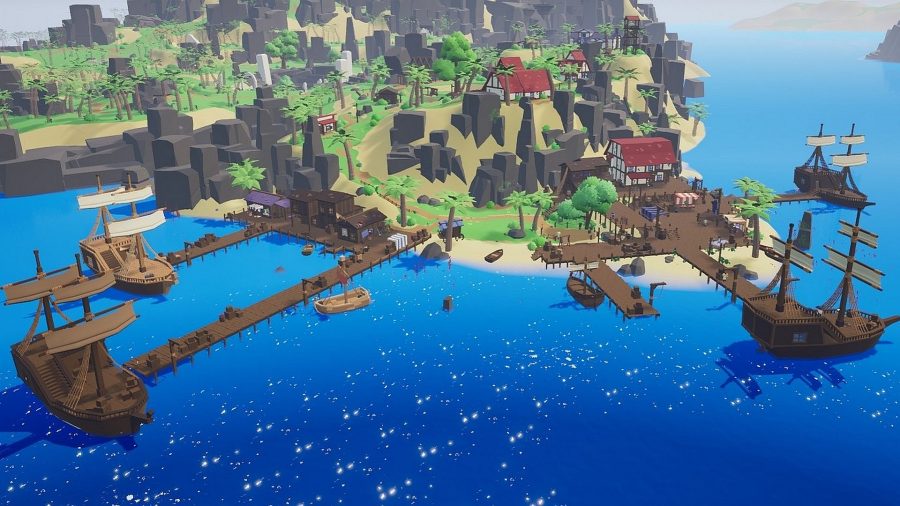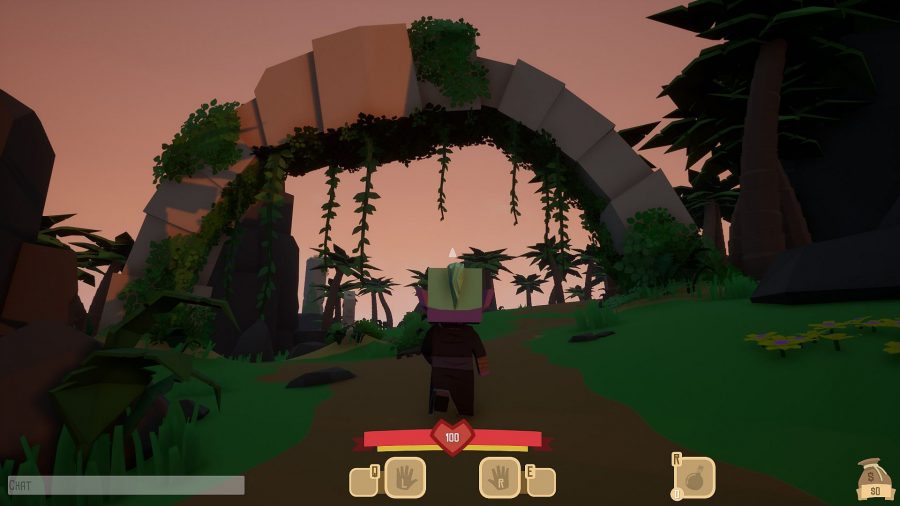Game development is usually a collaborative effort. Some teams are massive studios in multiple locations, while others are far smaller. Kindred Games – makers of indie game Swords ‘n Magic and Stuff – is made up of four developers who are responsible for all the in-game art and coding, as well as a handful of important contributors for key art and illustrations, music composition, and community management.
Kindred Games also has another key member of the team – well, key members, to be exact. During Twitch streams, viewers leave suggestions for what they would like to see within the game. These suggestions are then managed by several Discord and Twitch moderators, who incidentally also assist with in-game dialogue, announcement updates, and editing trailers.
The fruits of this partnership are taking shape, as Swords ‘n Magic and Stuff has just come out in early access on Steam. We had a quick chat with Kindred Games’s lead designer and artist Michael Kocha to discuss how the Unreal Engine brought the game’s unique visuals to life, and why early access has essentially saved the project from the looming risks of feature creep.
Swords ‘n Magic and Stuff is an open-world RPG game, but you can stop making any comparisons to Skyrim or The Witcher right there. Take one look at a screenshot and it’s more likely to call Minecraft to mind – its family-friendly, almost Lego-like aesthetic is a rare presentation of this kind of subject matter.

“When I first started making Swords ‘n Magic and Stuff, it was out of desperation for a game that my wife and I could play together and both equally enjoy,” Kocha explains (his wife is also the community manager for their small studio, Kindred Games). “She’s into life and farming sims and I prefer exploration and adventure, but I wanted a world that valued both equally.
“Swords ‘n Magic stands out in our approach to that balance between life sim and RPG. There are many games out there with a heavy lean into the casual life sim and a sprinkle of combat or other RPG elements. Our goal is to build an immersive world where you can play how you want, and never feel like your playstyle wasn’t the developer’s focus.”
We wouldn’t quite go as far as to say ‘unique’, but it’s certainly an uncommon premise, and aesthetic, in the genre. And appropriately enough, it’s had an equally unusual development process – one which had relied heavily on Twitch. As the developers played early builds, they invited suggestions from a live audience. As with all open forums, it led to an abundance of ideas: “Developing the game live on Twitch definitely led to a good amount of feature creep with everyone sharing their ideas each stream,” Kocha says.
Thankfully for Kindred Games, Unreal Engine 4 had a secret weapon to help with that. “Fortunately, between the art style and our use of Blueprints [Unreal’s visual scripting system], it’s actually pretty quick to build content for the game,” Kocha explains. “We had to keep our content pipeline in mind throughout the entire development, so when we finally launched in Early Access, we would be able to produce regular updates without having to rewrite any systems. This takes a lot of work upfront but it was ultimately worth the time investment.”
This abundance of ideas, and the fact that Unreal has been such a help in iterating and producing them quickly, has translated to what Kocha describes as “a pretty robust list of features” which would turn even triple-A RPGs green with envy. These will include “player housing, fishing, cooking and crafting, mounts and pets, and a main storyline that sort of sneaks up on you, rather than being at the forefront of the game,” as Kocha puts it. “Plus there will be many other smaller features that we can’t wait to get to work on, like Twitch integration.”
Handy? Check out the best crafting games on PC
And it doesn’t stop there. Swords ‘n Magic’s release into Steam Early Access is intended to source and incorporate even more feedback, dovetailing neatly with the iterative approach to development that Kindred Games has taken and the choice of Unreal to complement it. “Early Access made a lot of sense for Swords ‘n Magic based on our already-transparent development practices with our Twitch and Discord community. We decided that continually adding content onto our base game would work for an Early Access release and that we would highly benefit from player feedback throughout that process.”
While Kocha says that developing the game on Twitch “gave us a lot of great insight into what players did and didn’t like, nothing beats watching a player stream the game for the first and actually experience it. So far into development, we’ve already made a few drastic lane changes based entirely on our early player feedback in Early Access, and I think the entire team is really grateful to have an opportunity like this.”
Kindred Games is only three people. No matter how quick Unreal is or how efficient their development process, it all seems a little ambitious for such a small studio. But the team has one other thing going for them: that striking art style, which in fact was conceived from the start to be easy to make.
“The first real challenge for me was definitely the abundance of art needed for an open-world game, and luckily, between my experience with 3D art and Unreal Engine, I was able to find a workflow that allowed me to produce art quickly and effectively. I started homing in on a style that I believe takes low-poly to a very polished, professional-looking level while still being quick to produce.”
However, while Swords ‘ Magic’s aesthetic “started out as a means to produce quick art, it slowly evolved into a more honed and polished style,” Kocha says. “While traditional low poly art has a high focus on decimated triangles, I chose to avoid that entirely and focus more on cleaner, blockier shapes. I think it lends a very fun and light-hearted feel for the game and that’s exactly what I wanted to capture. Many players want to jump in and explore every nook and cranny and see what the world holds, and this art style turns that sort of playstyle into a very rewarding experience.
“The combination of the more traditional low-poly style with more physically based rendering techniques with the use of metallic, roughness and emissive channels gives the game a much higher quality feel and I think it sets a really nice tone and a higher bar low poly art.”
It turns out Unreal was a big help here, too: “Using Unreal’s material instances, I was able to build hundreds of lightweight materials with simple PBR shaders as well as more complex materials for effects.”
After doing so many developer interviews for this series, one tends to see patterns emerge. Perhaps the most consistent is the sheer scale of what small teams are able to build through smart, efficient use of Unreal Engine 4, and Swords ‘n Magic and Stuff is one of the all-time best examples of this. For just three people to be able to make an open-world RPG – traditionally one of gaming’s most ambitious genres – with so many systems and features would’ve been unthinkable a generation or so ago.
But it’s possible, with smart choices around iterative development, an efficient art style that nonetheless remains attractive and distinctive, and a little help from good tech. And Kindred Games has no plans to rest on its laurels.
“We have a pretty detailed development map laid out in front of us over the course of the next year and a half,” Michael says. “Once all of our planned features and content are in, there’s no telling where we can take the game. The design really lends itself to continual development, so DLC or expansions are always an option to give players more content beyond the abundance we already have in store.”
Related: Check out the best MMOs on PC
And beyond that? “Being a small indie team and this as our first big project, we have a lot of other ideas and avenues we’re interested in exploring in game development, so who knows what the future holds.”
Swords ‘n Magic and Stuff is out now in early access – here’s the Steam page. Unreal Engine 4 is now free. Unreal Engine 5 is due to release next year.
In this sponsored series, we’re looking at how game developers are taking advantage of Unreal Engine 4 to create a new generation of PC games. With thanks to Epic Games and Kindred Games.
